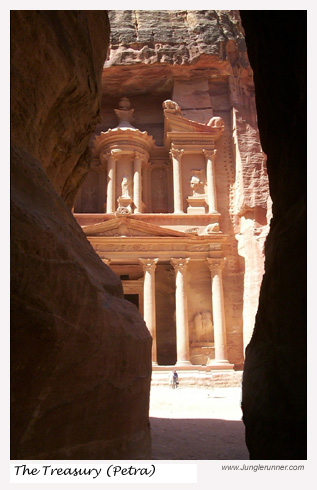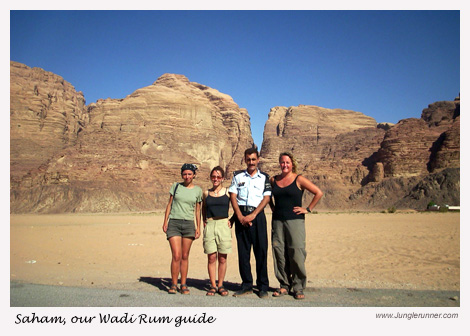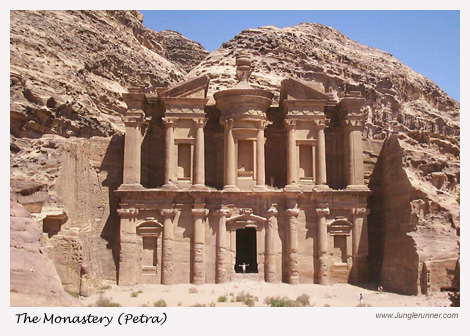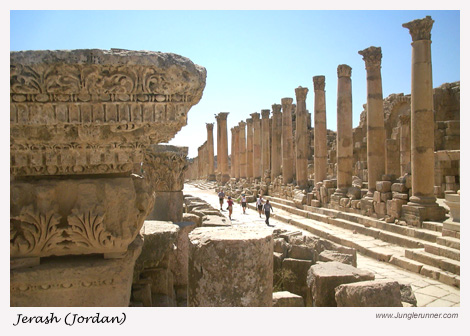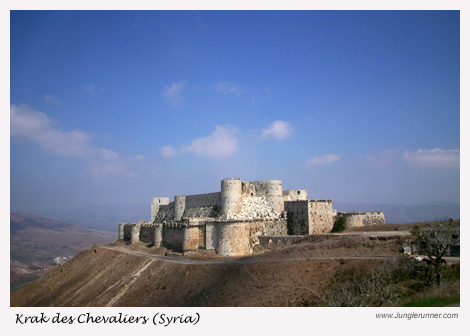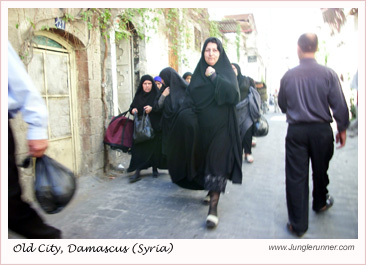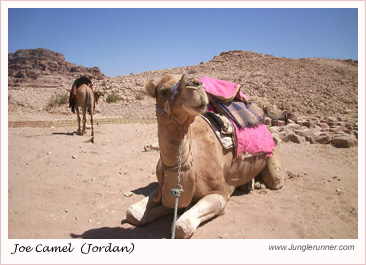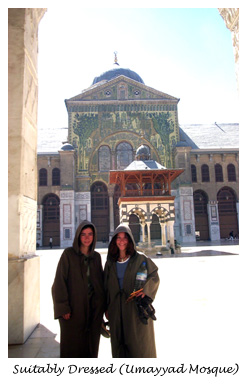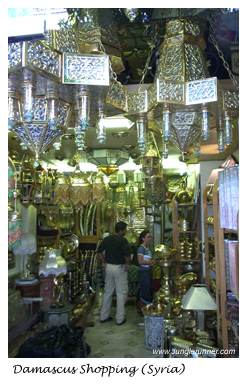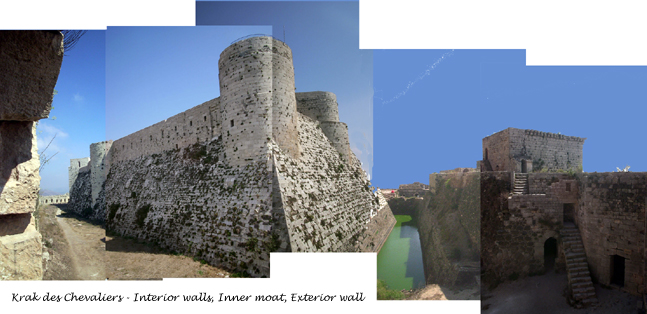
. . . LAND ROVER OVERLAND EXPEDITION
#12 - Jordan & Syria (Latakia, SYRIA) � Saham was sipping tea at the other end of our long table, sharing the shade at the tourist restaurant in Wadi Rum, watching the four of us bicker and laugh, arguing about how much desert driving we really wanted to do. Wadi Rum in southern Jordan is where the famous Lawrence of Arabia lived, and is reputed to be one of the most beautiful desert landscapes in the world. A panorama of red sand cut through by soaring cliffs � narrow wedges of rock that jut thousands of feet straight up. From out chairs on the shaded patio we could see a beautiful panorama. But after desert driving in Sudan and Egypt, we were debating whether to venture off the paved entry road into the park. Saham scooted his chair over and said earnestly, �I will be your guide, no problem, no money!� Since the terrorist attack on the US several days ago, we were nervous about being in the Middle East. And an offer to do several hours of work for free seemed really dubious. But Saham wore his blue Tourist Police uniform impeccably � how much trouble could we get into being escorted by a policeman, we wondered. It became obvious quickly that if we�d tried to tour the park on our own we would have missed the sights or gotten lost in the maze of tracks. Perspective is messed up in the park, distances are dwarfed by the towering cliffs. Saham led us to Lawrence�s well, the Seven Pillars of Wisdom, we scrambled up a stream bed to view centuries old Bedouin rock carvings, and had tea with a ranger. �What do you think about us traveling through Jordan, with everything that has been going on in the US?� we asked. �Of course you are safe here! Jordan is very much friends with the US. You know our new king, Abdullah, went to school in America and he spent so much time there that his Arabic is not very good at all.� Saham explained. �And the old king, Hussein, was a very wise man. He told the rest of the Arab nations that we are a poor country, we cannot afford to protect a 1000km border with Israel so instead we will make peace.� He laughed, �so now the Israelis come to Wadi Rum for vacation.�
From Wadi Rum we drove north along the mountainous spine of the country to Petra. 'This spectacular rose-stone city was built in the 3rd century BC by the Nabataeans who carved palaces, temples, tombs, storerooms and stables from the rocky cliffs. From here they commanded the trade route from Damascus to Arabia, and through here the great spice, silk and slave caravans passed. In a short time the Nabataeans made great advances in hydraulic engineering, iron production, copper refining, sculpture, and stone carving - all probably because of their great success in commerce.' (Lonely Planet) Most recently famous as the place where the last scenes of Indiana Jones and the Last Crusade were filmed. Petra�s fabulous rock carved buildings are truly memorable - the entrance is stunning. A long hike through the Siq, a 1km-long incredibly narrow defile in the mountain cliff, suddenly opens onto the towering fa�ade of the Treasury. Interestingly, the exquisite exterior leads to a very small, plain room. A case of false advertising if there ever was one. The rest of the city stretches along the canyon floor, the amphitheater, tombs of the nobles, street of facades, market road � but the best building of all is the Monastery, perched alone at the top of the canyon wall. Eight hundred steps later, a sweaty bit of hiking in the Jordanian heat, the visitor is rewarded with a breathtaking vista and soaring architecture. Standing like a speck in the giant door of the church, you have to wonder at the effort of carving such a huge structure into solid rock. Winding up the King�s Hwy we passed ruined castles, skirted the Dead Sea, and paused in Madaba to check out the mosaics. But we were on a tight schedule so we pressed on to Amman, the capitol of Jordan. Stretched over 19 very tall hills, the quality of the city is related to the altitude � the best parts are up high. Despite the thin budget we avoided the old city center laced along the deep valley floor, and hotel hopped in the upscale hill-top suburbs hoping to get lucky. One thing about traveling with several attractive women, they can be very effective at negotiating discounts. Jody and Sally disappeared into the El Sabeel Suites hotel and came back out a couple minutes later with big grins, �The deep discount price for one room is D35, but when the owner realized we were going to cram all four of us into the same room he just gave us a second suite for free!� To make the deal even sweeter, we were allowed to pop into the dinner theatre and watch the show for free. Fabulous food was followed by a selection of Broadway tunes modified for Amman (�Send in the tours� instead of �Send in the clowns�). We stayed two days. Sally and Jody went by the US embassy to leave some flowers at the gate, and watched a parade of officials from the other Arab embassies arrive to express their sympathies. It was comforting to know that almost everyone was united in their grief and outrage at what happened in NYC and DC. Sally flew back to Australia from Amman for a two-week break because she could not get a Syrian visa. The Syrian embassy in Cairo had spotted a suspicious border stamp and deduced that she had spent time in �Occupied Palestine� � evidently it�s not enough for the Israeli officials to stamp a detachable piece of paper, if there is even a stamp from a neighboring country�s border post, Syria will refuse to issue a visa. Jody had serious reservations about continuing. After all, Syria was recently considered a terrorist haven. But the great hospitality of Jordan convinced us all to keep going north. I�m a jaded tourist. By the fifth ruined city, the twentieth museum, it takes something special to make me want to stop. Gulin and Jody wanted to see Jerash but I spun a line about needing to stay on schedule and get across the Syrian border before sunset. In the end though, as the sign for the Jerash turn-off whipped past, the women said �Come on!� so I yanked the Rover right and we curled up the mountain to the ancient Roman ruins. Even I had to admit it was worth stopping. Jerash had been forgotten to history for a thousand years and passed to the present day remarkably well preserved. Though many of the buildings are in the process of being excavated, the main street is intact and stretches 600m flanked by hundreds of pillars. Standing on the stone steps across from the entrance to the Temple of Artemis, I could see the chariot ruts in the street and imagine the bustle of this Roman city a thousand years ago. Checking out of Jordan was accomplished with the same efficiency that we�d experienced coming in. Jody bought a bottle of Kahlua at the Duty Free shop and was cuddling it nervously as we crossed no-mans land to Syria. �All right, I�m just gonna start drinkin�!� she announced. �Might as well be happy before they chuck Miss American into a windowless cell.� �That�s what you want to do. Go through a border crossing reeking of alcohol,� I said. She reconsidered.. �Don�t worry,� said Gulin, the eternal optimist, �you will be fine. You�ll see.� The crossing was indeed fine, though, having to pay a $100 �penalty� for having a diesel engine left me wondering if I�d just been scammed. Please, please, let there be English signs, I prayed fervently as we left the border post. It had taken us two hours just to get out of Amman in Jordan and onto the right road north. I had visions of standing on the side of the road peering vainly at Arabic directions as traffic whizzed past. Thankfully, the roads were smoothly paved and the signs were frequently posted � with English subtitles. Damascus. Even the sound of the name is loaded with fascination. With our crappy Lonely Planet city map we dove into the middle of the ancient city, searching desperately for one of the handful of street signs labeled in our book. The problem with squinting through the gloom searching for the tiny English lettering beneath the Arabic text, is that even when you can read the name and yell it to the navigator, the spelling is obliterated by the pronunciation. Allow me to demonstrate; After circling for an hour we found a cluster of inexpensive hotels around the Square of Martyrs. Two very nice policemen who spoke not a lick of English helped us stalk a parking space for fifteen minutes. After finding a decent room we read in our guide book that we were in the middle of the brothel trade and most of the rooms in the vicinity rented by the hour. Never mind. It was clean, close to the Old City souqs (market stalls) and, being a Muslim country, there was not a streetwalker to be seen.
When in Damascus one must see the Umayyad Mosque, rated one of the best in the world by those in the know. Muslim tradition requires shoes to be removed and women to be appropriately attired. Gulin�s shorts were just not going to cut it, but fortunately the visitor center at the mosque provided robes with the modest admission fee. So I toured the vast open courtyard viewing the magnificent golden mosaics in the company of two little brown robed Ewoks. Inside the mosque was a long hall, several hundred meters in length and almost fifty meters wide, lit by rows of hanging chandeliers and carpeted with hundreds of carpets. Several dozen people sat on a small raised platform listening to an imam preaching, others lolled against the walls or pillars happy to be out of the sun. A pious old man wandered through the hall whacking his walking stick against the wall to wake up men who had dozed off � he reminded me of the Baptist ushers who chastised back row sleepers during the long preaching of Sunday service. A few hours north of Damascus is the relaxed town of Hama, a wonderful place to overnight with its lovely riverside park. �This is just so nice!� I said to Jody and Gulin again and again as we passed the huge wooden water wheels that are the centerpiece of the park. Families strolled through the park together, kids jumped off the high bridge into the river, geese swam, fountains sprinkled � there is something to be said for bad state TV and prohibited alcoholic consumption, it gets the families out together. Hama was our staging point to visit Krak des Chevaliers � described by TE Lawrence as simply "the finest castle in the world". Situated high atop rocky crag, its double moats, massive triple walls, and four-storey construction made it unconquerable. The shields of Richard the Lionheart are carved into the entrance, and the remains of the round dining tables are still visible. It could garrison two thousand men and send hundreds of knights to the battlefield, and for a thousand years through the ebb and flow of the Crusades it remained impervious to attack. In 1271 the great Muslim warlord Beybars marched on the castle with 5000 men, and an arsenal of war machines. By this time the Krak was a last lonely outpost in Arabia, the Christians were on the retreat, and only 200 men remained at the fort. In the end, despite having remaining provisions for five years they decided to trade the fort for a guarantee of safe passage. When the news arrived that the Krak had fallen, the entire Muslim world rejoiced. Even today, the massive structure seems to shrug off centuries of age - it remains an awesome sight. Further up the Syrian coast, after a terrific amount of wandering, we visited the Salah ad-Din Castle � not as preserved as the Krak, but fantastically situated on a sliver of rock thousands of feet up. Freshly grilled fish on the beach with the sun setting over the Mediterranean made for a memorable evening. From there it was a few hours drive to the Citadel of Aleppo. We barely scratched the surface of the kilometers of covered souqs in Aleppo's Old City � the ultimate urban mall long before the North American version made its appearance. With tourist traffic low, vendors were anxious to sell their silver and gold for deep discounts � we obliged. On the way to the border we put the last of our Syrian dinar into the tank, 56 liters for $7. Very nice. Our departure was equally sweet � the grizzled corporal asked me something in Arabic, I shrugged and said �Canadian!�. He ordered his subordinate to stamp us out post-haste, cleared a path through the line of ancient taxis waiting for inspection, and we were through to Turkey. Sitting in a sparse but clean hotel room in Latakia, a cosmopolitan town on the edge of the Mediterranean Sea, writing this Middle East journal, it seems such a shame that perceptions of the Arab states are so skewed. Gulin came in twenty minutes ago proudly carrying a cantaloupe given to her on the street. Jody popped in bubbling about the great conversation she�d had in the lobby with the owner and his friend � both wanting to practice their English. As we�ve gone from town to town through Jordan and Syria people have greeted us the same way; �Welcome!� Offers of free food and drink, gifts (admittedly more for the cute women than for me), and simple friendliness, have marked the length of our trip. How unlike my perception one week ago. It makes Saham�s comments back in Wadi Rum seem even more poignant, �You are worried about your safety, but you will find that most Muslims are wonderful. After the attack on the US, will America realize this?�
|
All rights reserved
